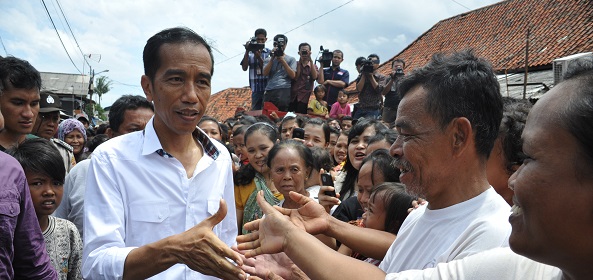China major factor in Indonesia’s elections
April 3, 2019 | Expert Insights

President Widodo is likely to be assailed by other presidential candidates over perceived softness on China, making China a key factor in domestic electoral considerations.
Background
The Republic of Indonesia is a Southeast Asian nation that occupies a strategic location between the Indian and Pacific oceans, sitting on an important transhipment route. Comprised of over seventeen thousand islands, Indonesia has a population of over 261 million and is the world’s most populous Muslim-majority country with over 87.2% of the population professing Islam. As a republic with a presidential system, constitutional power is concentrated in the central government. As a multi-party state, no political party has managed to secure a ruling majority, with the president constitutionally permitted to serve a maximum of two consecutive terms.
As geographical neighbours despite the lack of a common border, China and Indonesia have been in constant contact with one another. Most relations throughout history were motivated by trade with largely peaceful contacts. During the colonial rule of the region, many Chinese immigrants settled in Indonesia to meet labour requirements, resulting in a significant Chinese-Indonesian population. China and Indonesia have recently been involved in a territorial dispute in the South China Sea where China’s nine-dash line overlaps a portion of Indonesia’s exclusive economic zone. In December 2018, China’s Xinjiang re-education camps and alleged abuse of Uyghur Muslims were discussed in parliament, although the matter was dismissed as the domestic affairs of another country.
Joko Widodo, Indonesia’s incumbent president, was previously the Mayor of Surakarta and then Governor of Jakarta from 2012 to 2014. Mr. Widodo does not come from an elite political or military background attaining prominence and support during his term of Governor of Jakarta, Indonesia’s capital and largest city.
Analysis
Joko Widodo, the president of Indonesia, is currently preparing for an election on April 17, 2019. In addition to the presidential referendum, 190 million eligible voters will also vote in the People’s Consultative Assembly, Indonesia’s legislative branch. Mr. Widodo is pitted against Prabowo Subianto in a rematch of the 2014 general election. The contest is fought over the next five-year term of 2019-2024.
Mr. Prabowo Subianto is a former Lieutenant General of the Indonesian National Armed Forces. In 2014, Mr. Subianto was defeated by incumbent Mr. Widodo to the presidency. Mr. Subianto is the son of a prominent Indonesian economist and was the son-in-law to Indonesia’s second President, Suharto. He was dishonourably discharged from the military and banned from entering certain countries following his actions during the Indonesian political crisis.
China has engaged in a number of infrastructure projects in Indonesia, most notably the Jakarta-Bandung high-speed trains, a US$6 billion enterprise linking Jakarta with Bandung. The project has been hampered by delays and concerns over China’s financial support, including from within Mr. Widodo’s administration. Tom Lembong, Indonesia’s investment chief said, “The Jakarta-Bandung high-speed train represents everything that’s wrong with (China’s) Belt and Road,” over concerns that the project is opaque for “even us cabinet members are having trouble getting data and information.” Issues over the financial structure of the project have been picked up by Mr. Subianto who is using anti-Chinese sentiment as a tool to gain ground on the electorally surging Widodo.
Other powers in the region have swept to power candidates who have assumed anti-Chinese rhetoric, including Malaysia and Maldives. Still, others have reassessed Chinese projects within their countries, such as Myanmar and Thailand.
Mr. Subianto’s potentially anti-Chinese position presents a dilemma for Mr. Widodo who needs to revive the labour market and overcome a shortfall of government revenue. Consolidated ties with Beijing would help secure billions of dollars in low-cost financing while allowing for infrastructure projects such as the Jakarta-Bandung high-speed rail that provide jobs. Simultaneously, Mr. Widodo cannot be perceived as weak in regards to China, especially given the gaining impression that Indonesia is already beholden to China. Mr. Subianto is likely to help shine a spotlight on President Widodo’s dealings with China, while Mr. Widodo is likely to highlight other infrastructure projects with other nations such as Japan. However, Mr. Widodo’s campaign is likely to struggle to downplay his dealings with China given the US$91 billion projects proposed between the two during the Widodo presidency. Therefore, Mr. Widodo is unlikely to assume a critical position of China during his canvassing, while Mr. Subianto will employ the full scope of the critique to his advantage during April’s elections, making China a key factor in Indonesia’s domestic affairs.
Assessment
Our assessment is that while Mr. Widodo is reluctant to speak critically of China, other candidates are likely to take advantage of Mr. Widodo’s situation by exploiting the regional anti-Chinese electoral position. We believe that Mr. Widodo will seek to downplay his ties with China while focusing on other electoral considerations such as the Muslim vote. We believe that President Widodo’s dealings with China place him in a difficult position between his presidential duties and his desire to be re-elected.








Comments